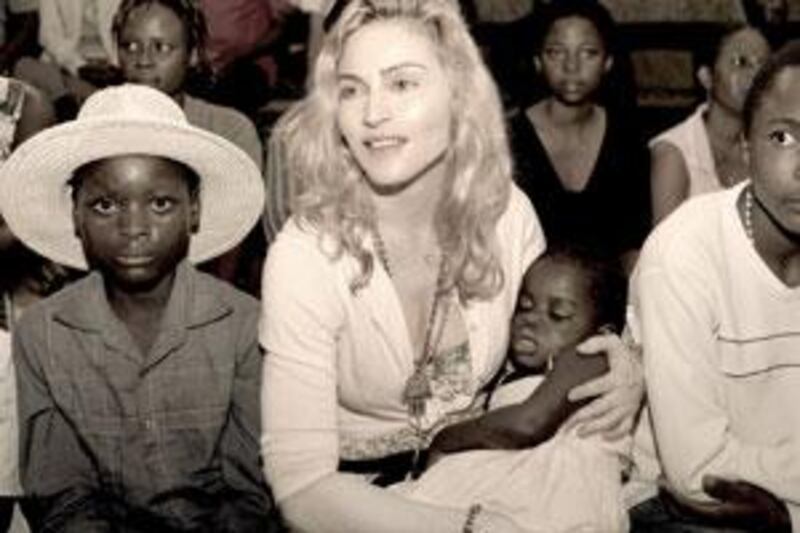When Madonna was finally given permission to adopt the Malawian orphan Chifundo Mercy James last week after the Malawi Supreme Court of Appeals overruled the Malawi High Court's decision to thwart the 50-year-old pop star's plans, onlookers were split in their opinions. No one has denied, of course, that Madonna is a scarily determined operator, letting nothing get in the way of her desire to adopt Mercy. But while some people - including NGOs and Mercy's long-lost father (that's right, she is not an orphan after all) - were reportedly furious at the decision, doubting Madonna's motives and ability to care for the child, the more common view seemed to be that one lucky little girl was going to have an amazing life opportunity available to none of her contemporaries. Not fair, exactly, but certainly good for the child.
Like her new brother David Banda, three, who was controversially adopted by Madonna in 2008, the four-year-old Mercy was found in one of Malawi's many orphanages, which are filled with children who have been orphaned as a result of the shocking Aids crisis in the southern African country. It is estimated by the American charity ActionAid that one in seven Malawians is living with HIV, making it a country that has one of the highest rates of HIV/Aids in the world. There were an estimated 560,000 Aids orphans by the end of 2007 (out of roughly a million orphans in all), a figure expected to increase dramatically. Madonna's response to this has been to establish a charity, Raising Malawi, dedicated to alleviating poverty in the country and helping the orphans there.
For many commentators, though, there is no substitute for blood ties, which both Mercy and David still have. Mercy's grandmother, Lucy, has fought her adoption for three years, finally giving in to the girl's uncle, who believes leaving Malawi can only be a good thing for her. David's father has said he did not fully understand the adoption process, expecting his son to be returned to him eventually, especially in the light of Madonna's divorce from Guy Ritchie. Yet the life expectancy in Malawi is 40 and one in six children dies before the age of six; sparing one child this future seems an act of kindness.
The question remains, though: can Madonna give David and Mercy a better life? Certainly they will have a more comfortable existence, afforded every luxury, a money-no-object education and, by all accounts, a doting mother. Well, sometimes. Because just three weeks after Mercy arrives in New York, reportedly flying by private jet, having spent two months learning English and "western manners" in a private nursery school, her new mother will be on a plane herself, commencing the seven-week European leg of her Sticky & Sweet tour. Like David, Mercy will have an entire entourage at her beck and call, and will be cared for by a nanny. Which raises the question: if you are going to turn your child over to someone else to be brought up, why bother adopting?
Still, Madonna's children do seem to be remarkably accomplished. When a nanny recently left Madonna's employment, the world got a tiny, if sugar-coated, insight into the queen of pop's domestic arrangements. Unwilling to dish any real dirt at all, Angela Jacobsen, who had been David's carer for 21 months, sensationally revealed that, contrary to the impression given on her Facebook site, she rather liked Madonna. The reason her tenure had ended, she said, was that she spoke no French, which David and his siblings were learning.
Among the aspects of life with Madonna that are routinely mocked in the press are the famous Kabbalah-based macrobiotic diet, the no-TV rule and the rules reportedly laid down for her estranged husband Ritchie to dictate his behaviour in the marriage and, latterly, when seeing their children. But how extreme are these rules, truly? Ditching the junk food certainly seems a good thing for children, and it is unlikely in any case that Mercy would ever otherwise have had access to a McDonald's or a Krispy Kreme: the scarce staple food in Malawi is maize, used in a sort of porridge. So we can tick the "better-off" box here.
Ritchie is said to have been ordered to read only Madonna's books to the children at bedtime - but is the monocultural English Roses collection really inspiring reading for Malawian orphans brought up between New York and London? A touch controlling, perhaps. As for the reported ban on newspapers and magazines: it may prevent them from reading less-than-sweet things about their mother, but it will also prevent them learning the basic important facts and mores of society, from culture to world poverty (something they have narrowly avoided experiencing themselves). And without having ever seen a gossip mag, they might also wonder just why everyone keeps taking pictures of them.
Finally, most notoriously, television is banned in Madge's household - as in many well-meaning households around the world. Certainly there is evidence that too much TV at an early age may stunt learning, but for anyone who as a child was banned from watching the edgy British school drama Grange Hill (or your local equivalent scandalous kids show) knows, too little TV can stunt your social growth.
Nevertheless, maybe she's onto something: after all, if anyone knows about the potential for television and the media to manipulate the mind, it's Madonna.





